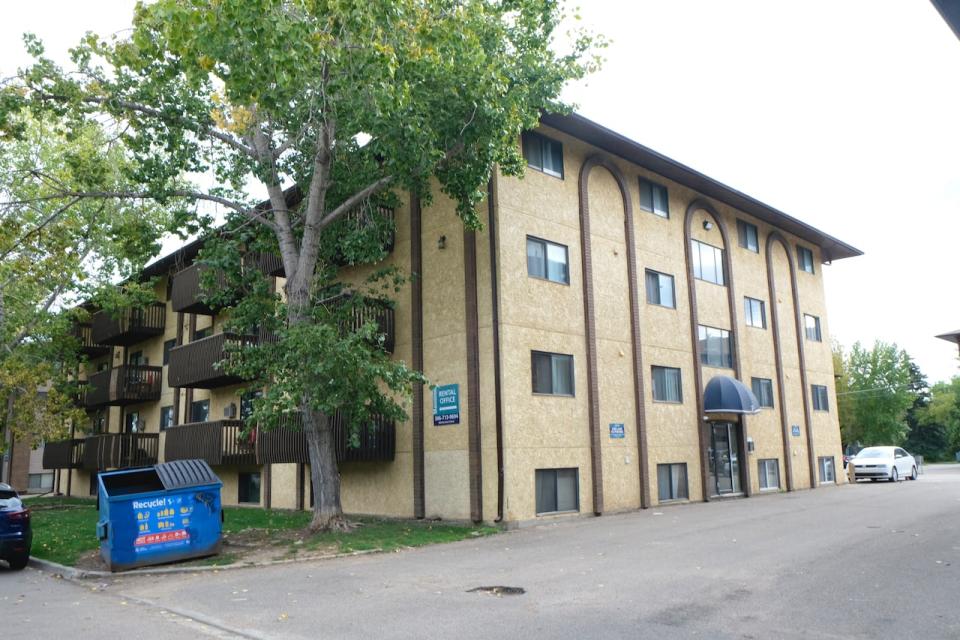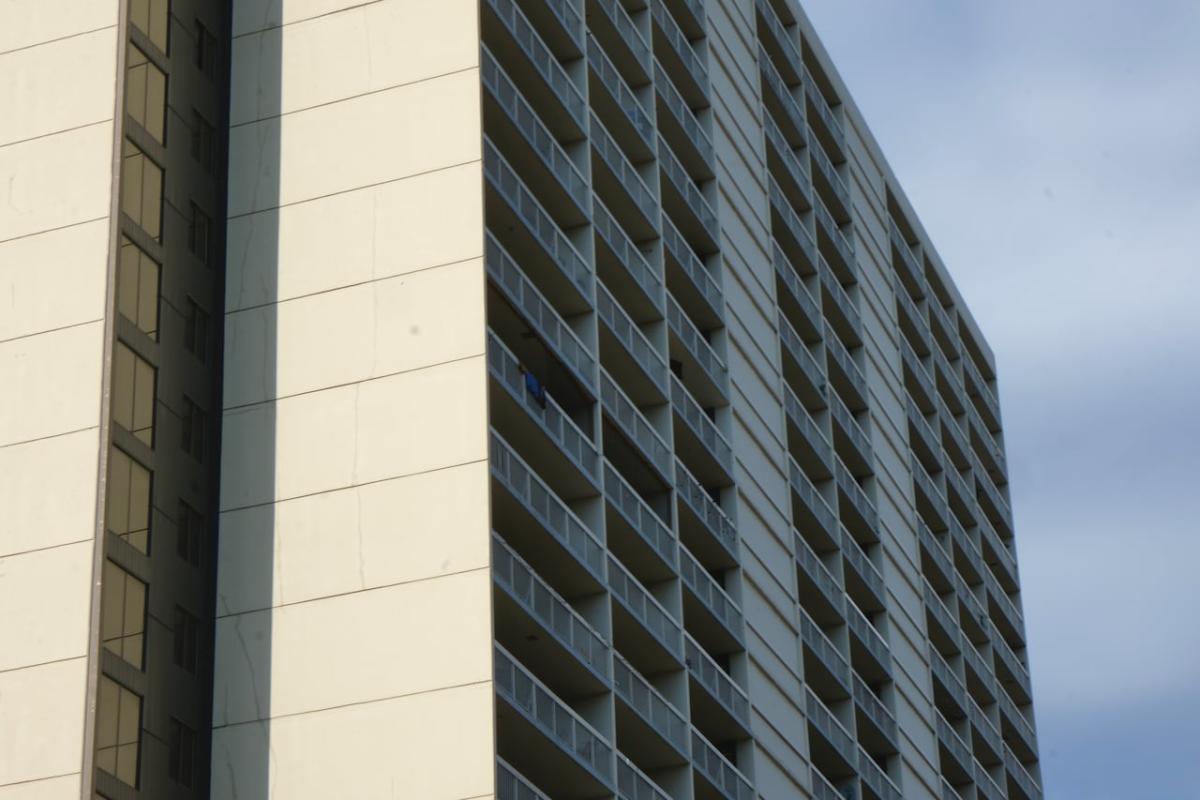Rielly Castle likes his Saskatoon apartment, but he’s not sure he’ll be able to afford living there much longer.
The University of Saskatchewan grad student lives in a one-bedroom apartment owned by Mainstreet Equity, a publicly traded real estate company that owned 18,351 units across Canada as of its most recent quarterly report.
When Castle moved in three years ago, his rent was $750. That rate included a $100/month student discount. That student deal is no more and rent has steadily increased since then.
He now pays about $1,200 per month.
“Right now with my regular work salary, it’s now kind of on the edge of being just enough to get by,” he said.
“If it were to increase any large amount from like next year when I go to try to renew my lease, I probably will have to leave.”

Rielly Castle is pictured in his basement suite apartment in Saskatoon on Sept. 16, 2024. He says if his rent is increased anymore he might need to move out. (Liam O’Connor/CBC)
According to the latest rental report from Rentals.ca, Saskatoon is the cheapest option among the major Canadian cities listed, but the year-over-year increase for the month of August is greater than almost anywhere else in the country.
The asking price for a one-bedroom apartment is $1,218, a 15.5 per cent from the same time last year, and a two bedroom is $1,469, an 18.4 per cent.
Mainstreet said in an email that increases are necessary to sustain its buildings and because of increasing operating costs like property tax, utilities and maintenance.
“While we understand that any increases can be difficult, our rent remains below the market rent for Saskatoon at $1,060 in comparison to the average of $1,350 because our model is affordable for all,” Mainstreet said in an email.
Rent increases
Castle isn’t alone in his concerns about increasing rent.
Kevin Casey lives in an apartment owned by Weidner Apartment Homes, a U.S.-based company that owned 68,462 units, including 6,444 units in Canada, as of April 2024, according to Yahoo Finance. Casey is saying goodbye to his one bedroom after about two and a half years.
He likes his place overall. It’s quiet and close to work for him.
He said his rent was about $1,055 when he moved in 2022, which he thought was fair. Fast forward to 2024, after several rent hikes, and it’s set to go up to $1,450 soon, he said.
“I had no intention of renewing the lease once I saw that was the price,” said Casey.
“I do have something lined up with a friend which would cut rent down quite a bit. I know his rent is going up, but even with his rent raising it’s going to be equivalent to what I’m paying right now, which is that $1,350, but it’s a two bedroom versus my one bedroom.”
CBC reached out to Weidner Apartment Homes for comment.
‘Financialized’ landlords
Research says a rise in so-called ‘financialized’ landlords may be pushing up rents in Canada.
Financialized landlords is a term used to describe corporations with shareholders that own rental properties as an investment.
According to research by Martine August, a housing expert at the University of Waterloo, the biggest financial firms now collectively own close to 400,000 suites — nearly 20 per cent of the purpose-built multi-family rental units in Canada.
August said the business model often leads these landlords to cut costs on buildings while also finding ways to raise rents.
“Financial firms are raising rents higher than other types of landlords. On average, after a financial firm acquires a building, they increase the eviction-filing rate by three,” August said. “They triple it.”
August said when she did her research into financialized landlords back in 2017, Saskatchewan stood out for having a higher proportion of Real Estate Investment Trusts or REITs.
She said that’s because of weak laws governing rent increases in the province.
“Saskatchewan has half the rental housing that Manitoba has, but when I did my research in 2017, it had 70 times more REIT owned units, 70 times more,” said August.
Her research suggests the lack of rules attract corporate landlords because it’s easier to raise rents, making for an attractive business model.


The outside of a Mainstreet apartment in Saskatoon. Mainstreet said in an email that increases are necessary to sustain it’s buildings and also because of increasing operating costs, like property tax, utilities and maintenance. (Liam O’Connor/CBC)
Peter Gilmer, an advocate who works at the Regina Anti-Poverty Ministry, said the rental market in Saskatchewan is “completely” out of control and financialized landlords do exist in the province.
“Certainly financialized landlords and corporate landlords are a big part of the driving force behind that. The moment that you have private investors, external private investors in the mix, their profit margin obviously becomes a priority factor in terms of the rental market.”
He said it’s not surprising there’s an increase in rents in the corporate landlord sector, and that it would have a “ripple effect” across the rental market.
Gilmer said housing is a human right that Canada and provinces have committed to under international law.
He argues there needs to be concern with “handing” housing over to the private market, especially when ownership becomes more concentrated.
“We know that corporate landlords, like others with wealth and power, can basically defend their own interests, but the governments do have a vital responsibility to protect those who cannot,” he said.
Gilmer added he also has concerns about landlords’ ability to evict based on renovations, a practice he wants to see banned.
Rent control?
CLASSIC Law provides free legal services and supports for people in Saskatoon who experience poverty or injustice. More than 20 per cent of its case work from 2023 to 2024 was residential tenancy matters.
Nicholas Blenkinsop, a lawyer at CLASSIC, said tenant-landlord disputes have been a common issue in the 10 years he’s been working there.
“I would say that there are more people that I’m seeing on a regular basis who are unhoused, or where housing is a problem, and where the problem is one which appears to have no easy solution,” said Blenkinsop. “There are too many people looking to find too few places that are affordable.”


Nicholas Blenkinsop is sitting at a desk at the CLASSIC Law office in downtown Saskatoon on Sept. 13, 2024. (Liam O’Connor/CBC)
Blenkinsop said the lower end of the rental market being dominated by a few big corporate players is a big danger for people living in poverty. If a tenant gets into a dispute with big players and the company will no longer rent to them, it can be very hard to find a place.
The Saskatchewan NDP recently promised some form of rent control on the pre-election campaign trail.
Blenkinsop said there is no rent control in the province currently, but there is a legal framework determining when and how often rent can be increased.
The CEO of the Saskatchewan Landlord Association, Cameron Choquette, argued against rent control.
“Rent control might seem like a a good idea in the short term, but what it does is it actually chokes off investment in rental housing and it decreases the quality of the housing stock over the long term,” he said.


Cameron Choquette, the CEO of the Saskatchewan Landlord Association (SLA), stands in a boardroom at the SLA’s office in Saskatoon. (Liam O’Connor/CBC)
A study done by the Canadian Mortgage and Housing Corporation found “there was no significant evidence that rental starts were lower in rent control markets than in no rent control markets.”
Choquette said there are economists who would disagree with that research.
As for the renters, both Castle and Casey said they are for rent control policies.

